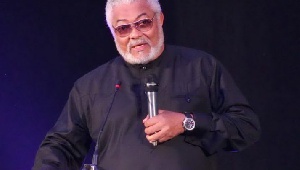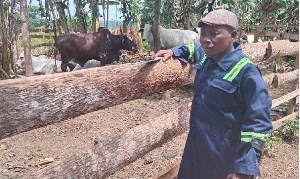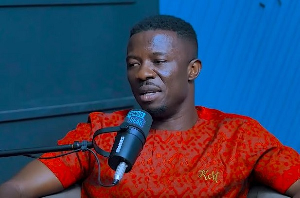Former President Jerry John Rawlings in 2014 stated that the killing of General Akwasi Amankwaa Afrifa, General Ignatius Kutu Acheampong, Utaka and other senior military officers in 1979 by the Armed Forces Revolutionary Council (AFRC) was “necessary” since it cleansed the country of corruption.
“We had no choice. We thought let two go. Acheampong and a certain Utuka, very corrupt Generals. They were sacrificed. It was not enough. Ladies and gentlemen, 10 days later, we had to sacrifice another six and some of the Commanders were innocent good people but it had to be done because the rage in the country was too high, too much.”
He added that the AFRC’s June 4, 1979 uprising had the support of the ordinary people. He condemned those who have “demonized” the AFRC for what happened instead of attacking the root cause of the problem.
Speaking at an event to mark the 38th anniversary of the 31st December revolution in Winneba, Former President Jerry Rawlings expressed worry about the depth of corruption and crime among Ghanaians and the level of negativity attached to the interventions by the AFRC.
“It is however unfortunate that some have chosen to siphon the negatives, leaving out the overwhelming gains made by these interventions of the people. The two interventions, June 4, 1979, and December 31, 1981, were not about Rawlings. They were the effects of the mood of the country and the mood of the people. In telling the story, the context and the circumstances cannot be discounted or overlooked.”
Read the full story originally published on January 9, 2014, on Ghanaweb
Former President Jerry Rawlings says the Armed Forces Revolutionary Council necessarily needed to have executed Generals Afrifa, Acheampong, Utaka and other senior Military Officers in 1979 to save the country from implosion.
“We had no choice. We thought let two go. Acheampong and a certain Utuka, very corrupt Generals. They were sacrificed. It was not enough. Ladies and gentlemen, 10 days later, we had to sacrifice another six and some of the Commanders were innocent good people but it had to be done because the rage in the country was too high, too much”, the former Military leader told students in the Volta region where he spoke as the Guest of honour at the closing ceremony of the regional camp of the International Youth Fellowship at the Adidome Senior High School.
He said the purge was necessary to cleanse the country of corruption at the time.
According to him, “The ‘kalabule’ had so badly gripped the society”.
“A soldier goes to the Makola market and is requesting for the price of a piece of cloth for his wife that he wants to buy, and he’s pleading and begging, out of disgust, the woman throws her urine at the soldier. Not once, not twice, three times we know of….why did she do what she did? She did it because people had grown so angry and were finding those of us in uniform so repugnant. In a situation like that, the poor solider - he only obeys orders - and yet, he is the one who ends up with the urine being thrown at him”.
“At that moment, he would take that woman and wanna kill her. At that moment, he would take his General and wanna kill him if he ever got his General. Ladies and gentlemen the rest is history in terms of what happened; the explosion that I tried to pre-empt 15 May ended up June 4. They thought I was going to be executed; the very thing I was trying to prevent is what happened”, he recalled.
He expressed amazement at the manner in which he and the AFRC have been demonised for what happened instead of attacking the root cause of the problem.
“In Africa, instead of asking ‘what is causing that pressure? Who opened the gas?’ We become oblivious, of the growing pressure, the smell of the gas because we are used to the corruption, we’re used to the inefficiencies etc, so that when the thing blows up, then we start asking who lit the match? Who blew it up? What a stupid question”, he yelled.
“…We should be asking, before the match was lit, what led to the smell of gas in the room?
He said the actions of AFRC in the June 4, 1979 uprising had the support of the ordinary people.
“When the explosion happened in that ‘79, ask anybody, your older folks, your parents, ‘let the blood flow was the signature tune of those day’. You know, when you humiliate people to the extent that I have seen over and over in this country – it happened in France, the Revolution in Russia etc etc, - in Ghana we even managed to contain it. When you humiliate people to that extent, you take away their dignity and respect, the day they explode, you can give them the diamond…they will kick it right back in your face and they’ll want your neck, your blood. That is what we witnessed in those days in “79”.
The AFRC was the government of Ghana from June 4, 1979 to September 24, 1979.
The AFRC led by young Flt. Lt. Rawlings - who had just two weeks earlier been rescued from near execution after his detention in a botched May 15, 1979 coup plot - railroaded its way into power through a bloody takeover that toppled another junta, Supreme Military Council.
The regime’s 'House cleaning' exercise against corruption led to the execution of Lt. Gen. Afrifa, Gen. Acheampong, Lt. Gen. Akuffo, Major Gen. E. K. Utuka and four other senior officers.
General News of Thursday, 9 January 2020
Source: www.ghanaweb.com













